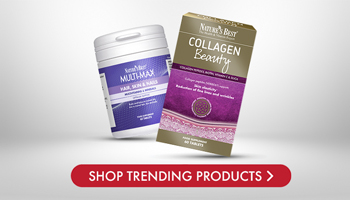
How do anthocyanidins support collagen?
The most abundant protein in the body, collagen provides the scaffolding for our skin, ligaments, cartilage, muscles and capillaries, and blood vessels. Quite literally, it’s the ‘glue’ that holds us together.
Many nutrients protect and preserve collagen. Recently, however, attention has turned to a class of compounds called anthocyanidins, a group of deep red, purple, and blue pigments found in plants. Research suggests these highly active antioxidants are unique in their ability to prevent collagen destruction (1).
Where can you find anthocyanidins?
The natural world is abounding with these powerful plant compounds. Strawberries, blackcurrants, blueberries, grapes, mulberries, black raspberries, cherries, purple rice, black beans, purple corn and purple sweet potatoes are all rich sources of anthocyanidins.
Besides increasing your dietary intake, you may also wish to supplement with a high-strength anthocyanidin formula, such as Colladeen® Original, which is packed with active plant compounds to buffer levels.
Anthocyanidins and collagen
Anthocyanidins are believed to support collagen integrity throughout the body, making them a great addition for many areas of health.
Eye health
The skin around the eyes is the most fragile and delicate of the entire body. Dehydration can make blood vessels more prominent, revealing dark under-eye circles, while excess fluid can lead to puffiness.
Increasing anthocyanidins may support the collagen structures in capillaries and blood vessels, improving circulation around and to the eyes.
Anthocyanidins may even help prevent some age-related eye conditions, thanks to their ability to strengthen blood vessel walls (2).
Fluid retention
The human body is 60 per cent water. However, a build-up of excessive water (or fluid) in the circulatory system, tissues, or cavities can lead to fluid retention. This can often cause uncomfortable and unpleasant symptoms, like swollen ankles and feet, bloating, and breast tenderness, particularly during pre-menstruation for women.
Researchers believe anthocyanidins can support and strengthen collagen in capillary walls, which may prevent fluid from leaking into the surrounding tissues (3).
Skin health
Thanks to its fibre-like structure, collagen provides the main building blocks of skin, giving it elasticity, suppleness, and firmness. But from the age of 25, the body naturally produces less collagen each year. Environmental stressors, like the free radicals from pollution, cigarette smoke, and sun exposure can accelerate this loss even further.
Anthocyanidins are believed to have powerful antioxidant and free-radical scavenging actions, which may help protect collagen (4). You can find high-strength anthocyanidins and other plant extracts for skin – lutein, green tea, and vitamin C – in our best-selling skin supplement, Colladeen® Visage.
And if you’re looking for even more targeted skin health support, you may wish to try our high-strength collagen product, Collagen Beauty®. Derived from porcine collagen, this formula provides bioactive collagen peptides with biotin, vitamin C, and silica in capsule form. We’ve specifically optimised Collagen Beauty® to stimulate skin metabolism and counteract the loss of collagen.
It’s worth mentioning that Colladeen® Visage is a great vegan alternative to animal-derived collagen products.
Mobility issues
As collagen diminishes, you may also notice changes to your mobility and joint health. And this can make doing the things you love a little more challenging.
Anthocyanidins are often recommended to support the collagen structures within connective tissues, like cartilage, which helps to cushion and protect joints.
Find out more
If you found this piece on anthocyanidins and collagen useful, you can find similar guidance on our dedicated health blog. Alternatively, please get in touch with our team of expert Nutrition Advisors, who are on hand to provide free, confidential advice via email, phone, and Live Chat.
References
(1) Murray, M.T. (2020). 122 - Vaccinium myrtillus (Bilberry). [online] ScienceDirect. Available at: https://www.sciencedirect.com/science/article/abs/pii/B9780323430449001229
(2) Khoo HE, Ng HS, Yap WS, Goh HJH, Yim HS. (2019) Nutrients for Prevention of Macular Degeneration and Eye-Related Diseases. Antioxidants (Basel). 2;8(4):85.
(3) Christie S, Walker AF, Hicks SM, Abeyasekera S. (2004) Flavonoid supplement improves leg health and reduces fluid retention in pre-menopausal women in a double-blind, placebo-controlled study. Phytomedicine. 11(1):11-7.
(4) Murray, 122 - Vaccinium myrtillus (Bilberry).
